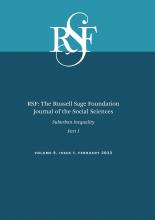Abstract
The number of Black suburbs has expanded since the 1960s, however, research on gender and how Black women contribute to their formation is understudied. Grounded in an intersectional framework, this article places women at the center of the analysis of Black suburban life. Using a multisite ethnography conducted during the Great Recession, I make a case for a Black diasporic suburb model and analyze the labor and household practices Black women use to sustain their families’ suburban lives. This article generates new insights into the heterogeneity of and Black suburbs in general, and the dynamic culture and economies of Black suburban women, in particular. Thus it contributes to new thought in Black feminist geography and the sociology of suburbs.
- © 2023 Russell Sage Foundation. Clergé, Orly. 2023. “Intersectionality Matters: Black Women, Labor, and Households in Black Suburbia.” RSF: The Russell Sage Foundation Journal of the Social Sciences 9(1): 86–103. DOI: 10.7758/RSF.2023.9.1.04. I thank Trina Vithayathil, Zophia Edwards, Cedric DeLeon, Kara Cebulko, and Grey Osterud for reading earlier versions of this work and providing feedback. A previous version of this article was presented at the Race in Marketplace Conference, Paris, France in 2019. Direct correspondence to: Orly Clergé, at clerge.orly{at}gmail.com, UC Davis, 1 Shields Ave, Davis, CA 95616, United States.
Open Access Policy: RSF: The Russell Sage Foundation Journal of the Social Sciences is an open access journal. This article is published under a Creative Commons Attribution-NonCommercial-NoDerivs 3.0 Unported License.






